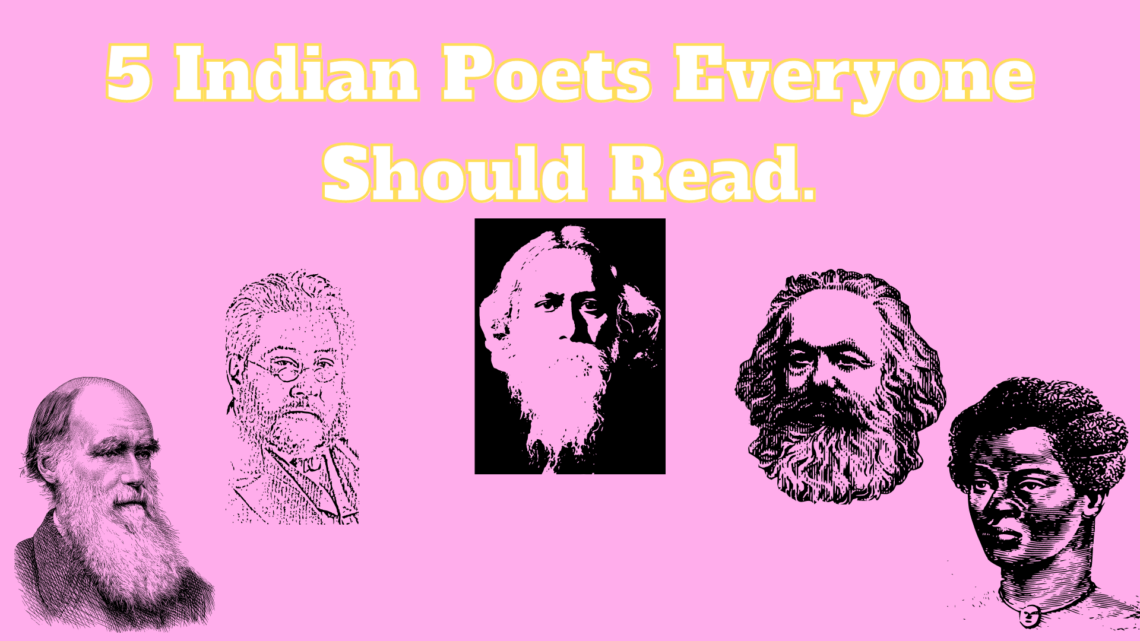
5 Indian Poets Everyone Should Read.
Poetry is the oldest and one of the most prominent forms of Indian literature. It has taken several forms and languages and touched millions of hearts. It has also changed the lives of Indian poets forever. When someone reminisces about poetry, the first thing that comes to mind is the works of a few famous and forever favorite Indian poets. From Mirabai to Rabindranath Tagore, there are five Indian poets everyone should know.
Sant Mirabai
Mirabai, a true devotee of Krishna, is known for her work in the Bhakti movement era of poetry in the 16th century. She dedicated her whole life to Krishna, went against the social and societal norms, including her in-laws, and treated Krishna as her husband. Meera and her work inspired a lot of folk tales and biographical legends. Devotional hymns by Meera and the Indian poets who adored her are famous even today in India.
Born into the Rathore Rajput royal family, Meera was married to Bhoj Raj, prince of Mewar. Five years of marriage later, her husband wounded in the war, died. According to historical literature evidence, Meera’s in-laws tried to kill her several times. According to a few hagiographic legends, despite efforts by various people in her life, she always survived.
Although there is no evidence of any manuscripts of Meera’s work, she is credited with two poems from the 18th century, 150 years after her death. “Paayoji maine Ram Ratan dhan paayo” is one of her most popular compositions. Thousands of padas are said to be written by Meera. Nevertheless, scholars find it controversial. The themes of Meera’s poetry revolve around Krishna and her anticipation, longing, and ecstatic joy of her union with Krishna. Meera Bai’s work is visible in Prem Ambodh Pothi of 1693 CE.
Kabir Das
Kabir is one of the most influential Indian poets of the Bhakti movement in the 15th century. His teachings and poems are still famous in India and several parts of the world. Although born in Varanasi, a city famous for its pilgrimage, he constantly criticized the unethical practices of Hindu and Muslim religions. Kabir’s legacy continues by a religious community called Kabir Panth.
Kabir’s birth accuracy has always been in debate. Few claim that he came from Satlok and incarnated on a lotus flower. Few accounts claim that he was adopted and raised by a Muslim couple, Niru and Nima. Kabir is said to be one of the disciples of the Bhakti poet Sri Ramachandraya. Persian text Dabistan-i-Mazahib claims Kabir to be a Vaishnava yogi and refers to him as Gang.
The themes of Kabir’s poetry revolved around devotion, the true meaning of God, the truth of life, and mysticism. Kabir’s wisdom poems are banis and consist of dohe and sloka. Kabir Bijak, Sakhi Granth, Adi Granth, Kabir Parachai, and Kabir Granthawali are said to be composed by Kabir and credited to him. There is no evidence of Kabir writing his poems, which are said to be composed in verbal forms. His disciples and followers are said to have passed on his poetry. He is said to have contributed to Guru Granth Sahib, the holy book of Sikhism.
Rabindranath Tagore
Although Many Indians know Tagore for his composition of Jana Gana Mana and Amar Shonar Bangla, he is more popular than we think. Rabindranath Tagore is the first non-European lyricist to win the Nobel Prize in Literature for Gitanjali. He is said to have reshaped Indian literature and art in the 19th and 20th centuries. Rabindranath Tagore, the youngest child of Debendranath Tagore and Sarada Devi, gained tremendous knowledge from his father.
Tagore wasn’t a fan of classroom education. He would always like to roam, learn and experience things. Tagore studied history, modern science, astronomy, and Sanskrit at the Santi Niketan estate. At eleven, he became mesmerized by Gurbani and Nanak bani. He wrote six poems and articles for a children’s magazine on Sikhism.
Tagore wrote poetry since he was eight years old. His poetry is said to be sensitive, beautiful spiritual, elegant, and even magical. Gitanjali, a collection of poetry by Rabindranath Tagore, is internationally renowned. He won Nobel Prize in Literature in 1913 for Gitanjali. Other notable works by Tagore include Sonar Tori, Balaka, Africa, Manasi, and Camalia. Every year, poetry recitals occur in events like Kabipranam and Rabindra Path Parikrama to pay tribute to Tagore globally.
Sarojini Naidu
Sarojini Naidu, the ‘Nightingale of India,’ was given the title by Gandhi, appreciating the imagery and lyrical quality of her poetry. She played an essential role in Women’s rights and India’s fight for Independence. Her poetry revolved around children’s themes as well as serious issues.
She wrote poetry in English, and her first book was The Golden Threshold. Her notable works include The Bird of Time, The Broken Wing, and The Feather of the Dawn. She wrote about the British’s exploitation of Indian mothers and India’s fight for Independence and partition. She dedicated The Broken Wing to Muhammad Ali Jinnah. She is said to be the most accomplished poet in India and one of India’s feminist luminaries.
Ramdhari Singh Dinkar
Known by his pen name Dinkar, Ramdhari Singh, is famous for his poetry on India’s independence fight. He is known as Rashtrakavi and is renowned among poetry lovers. The Indian government awarded the Padma Bhushan Award in 1959.
Dinkar wrote ten poems on satyagraha and published them in Vijay-Sandesh. As a patriot under British rule, he published under the pseudonym Amitabh. His notable works include Renuka, Rashmirathi, Samdheni, and Parashuram ki Prateeksha. The themes of his poetry revolved around bravery, patriotism, and freedom struggle. Kurukshetra, Sanskrit ke char adhyay, Urvashi, Baapu, and Singhasan Khaali Karo Ke Janata Aati Hai are some of his famous poems.




